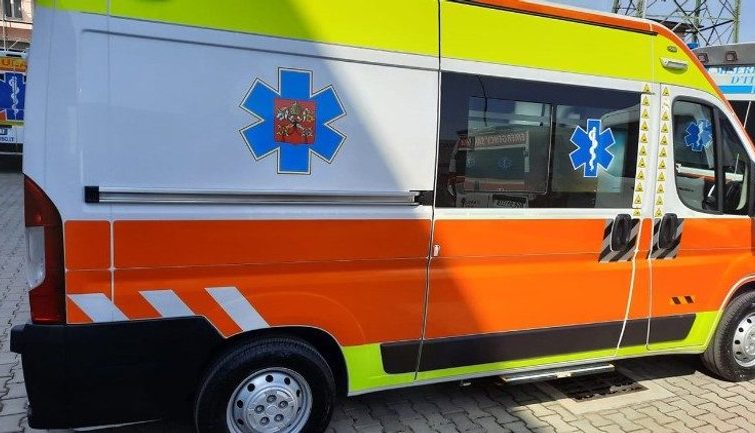
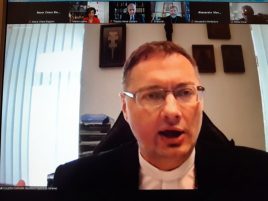 “The Holy Week has already begun for us. Cardinal Konrad Krajewski, the Holy Father’s special envoy for humanitarian aid in Ukraine, will be arriving at the nunciature in Kiev this evening. It will be a beautiful opportunity to experience the Easter Triduum together with His Eminence, and for me it will also be a token of the Pope’s immense closeness.” With this spirit, the nunciature in Kiev is preparing to celebrate Holy Easter this year. The apostolic nuncio Monsignor Visvaldas Kulbokas describes it in his interview with SIR. “We shall be living these days together – he says – on the occasion of the delivery of an ambulance to a hospital in Kyiv, a gift from the Holy Father; to visit the areas near Kyiv that have endured and been through terrible and indescribable pain; to meet with the Catholic communities and pray with them. Obviously there are many urgent matters. However, we shall try to live the Easter Triduum with fervent prayer.”
“The Holy Week has already begun for us. Cardinal Konrad Krajewski, the Holy Father’s special envoy for humanitarian aid in Ukraine, will be arriving at the nunciature in Kiev this evening. It will be a beautiful opportunity to experience the Easter Triduum together with His Eminence, and for me it will also be a token of the Pope’s immense closeness.” With this spirit, the nunciature in Kiev is preparing to celebrate Holy Easter this year. The apostolic nuncio Monsignor Visvaldas Kulbokas describes it in his interview with SIR. “We shall be living these days together – he says – on the occasion of the delivery of an ambulance to a hospital in Kyiv, a gift from the Holy Father; to visit the areas near Kyiv that have endured and been through terrible and indescribable pain; to meet with the Catholic communities and pray with them. Obviously there are many urgent matters. However, we shall try to live the Easter Triduum with fervent prayer.”
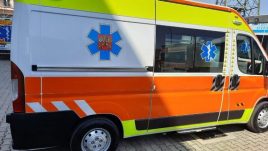 The Nuncio reviews the program of Card. Krajewsk’s visit to Kiev. Wednesday will be mostly dedicated to meetings and visits. On Holy Thursday, the ambulance donated by the Holy Father will be delivered to the Kyiv Heart Institute as a symbolic gesture of “the washing of feet”, after which the Cardinal will celebrate the Holy Thursday liturgy “in coena Domini” in the St Nicholas Church in Kyiv. “This Church epitomizes the current situation”, said the Nuncio, “because the upper area is being used – in coordination with the Ukrainian government – for the distribution of humanitarian aid, while the liturgies take place underground, in a sort of crypt.” Good Friday will be another “significant” day. “We plan to travel with the Cardinal to the terrible triangle of Vorzel, Irpen, Bucha and Borodyanka. We are not sure as to how much we will be able to see because the territory has been almost completely destroyed, and thus moving around, even if escorted by the police and other authorities, is likely to be very difficult and slow.
The Nuncio reviews the program of Card. Krajewsk’s visit to Kiev. Wednesday will be mostly dedicated to meetings and visits. On Holy Thursday, the ambulance donated by the Holy Father will be delivered to the Kyiv Heart Institute as a symbolic gesture of “the washing of feet”, after which the Cardinal will celebrate the Holy Thursday liturgy “in coena Domini” in the St Nicholas Church in Kyiv. “This Church epitomizes the current situation”, said the Nuncio, “because the upper area is being used – in coordination with the Ukrainian government – for the distribution of humanitarian aid, while the liturgies take place underground, in a sort of crypt.” Good Friday will be another “significant” day. “We plan to travel with the Cardinal to the terrible triangle of Vorzel, Irpen, Bucha and Borodyanka. We are not sure as to how much we will be able to see because the territory has been almost completely destroyed, and thus moving around, even if escorted by the police and other authorities, is likely to be very difficult and slow.
We are planning to visit the places where so many people have been subjected to death and agony of so many days, and to pray the Way of the Cross and the Good Friday liturgy together with them.”
On Holy Saturday, the Easter Vigil will be celebrated in the Roman Catholic Cathedral of Kyiv with Bishop Vitalii Kryvytskyi and with the participation of His Beatitude Sviatoslav Shevchuk. The Easter Sunday liturgy will be celebrated in the Roman Catholic cathedral.
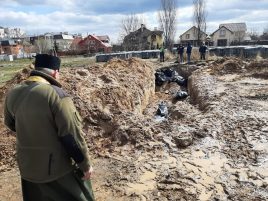 “We are living this Holy Week as a veritable Passion Week”, says the nuncio, as he mentions, one by one, all the atrocities witnessed over the past fifty days of war. His thoughts instantly go to Borodyanka, a town some fifty kilometres from the city of Kyiv. “I have been told that it’s an apocalypse, and that there were no military targets, so they bombed apartment blocks and houses and destroyed everything. Ten days later, the bodies still can’t be removed from the rubble because the entire area is covered with landmines: in homes, in dishwashers, in car boots. They explode wherever you walk. The area must be cleared.” And if people are not killed by bombs, they die of starvation. “Two weeks ago – says the nuncio – an assistant at the nunciature told me he had seen an elderly woman in Kyiv picking up pieces of bread from the ground, she clearly had nothing else to eat. The situation in Kyiv is slowly improving, although a return to normality remains a distant prospect.”
“We are living this Holy Week as a veritable Passion Week”, says the nuncio, as he mentions, one by one, all the atrocities witnessed over the past fifty days of war. His thoughts instantly go to Borodyanka, a town some fifty kilometres from the city of Kyiv. “I have been told that it’s an apocalypse, and that there were no military targets, so they bombed apartment blocks and houses and destroyed everything. Ten days later, the bodies still can’t be removed from the rubble because the entire area is covered with landmines: in homes, in dishwashers, in car boots. They explode wherever you walk. The area must be cleared.” And if people are not killed by bombs, they die of starvation. “Two weeks ago – says the nuncio – an assistant at the nunciature told me he had seen an elderly woman in Kyiv picking up pieces of bread from the ground, she clearly had nothing else to eat. The situation in Kyiv is slowly improving, although a return to normality remains a distant prospect.”
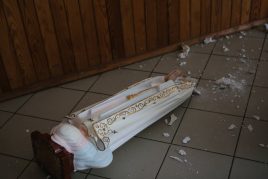 His thoughts then go to the seminary in Vorzel, where, according to first-hand reports from the rector and the bishop, everything has been destroyed. “Even the statue of the Virgin Mary was thrown to the ground. That’s what war is like. The soldiers come and they steal and destroy everything.” The director of the Kyiv cardiology institute’s branch in Bucha told the nuncio that all the equipment had been “deliberately” destroyed by the military. “They entered every office and destroyed computers and other devices.
His thoughts then go to the seminary in Vorzel, where, according to first-hand reports from the rector and the bishop, everything has been destroyed. “Even the statue of the Virgin Mary was thrown to the ground. That’s what war is like. The soldiers come and they steal and destroy everything.” The director of the Kyiv cardiology institute’s branch in Bucha told the nuncio that all the equipment had been “deliberately” destroyed by the military. “They entered every office and destroyed computers and other devices.
War is not just bombs, military and civilian casualties, it is utter and deliberate devastation.”
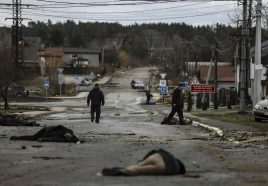 The towns of Vorzel, Irpen and Bucha distance 20-25 kilometres from the nunciature: “for more than a month we could hear the gunfire and the fighting. In those moments – says the nuncio – I thought that if even one shot in a thousand had killed or wounded one person only, it would have been one too many.” Msgr. Kulbokas then tells us about the “children on whose backs their parents wrote their first and last names, date of birth and contact numbers so that in the event of the parents’ death, people would at least know who the child is and where to find their relatives.”
The towns of Vorzel, Irpen and Bucha distance 20-25 kilometres from the nunciature: “for more than a month we could hear the gunfire and the fighting. In those moments – says the nuncio – I thought that if even one shot in a thousand had killed or wounded one person only, it would have been one too many.” Msgr. Kulbokas then tells us about the “children on whose backs their parents wrote their first and last names, date of birth and contact numbers so that in the event of the parents’ death, people would at least know who the child is and where to find their relatives.”
Speaking of reconciliation and forgiveness in Kyiv. “Reconciliation yields fruits if it allows the people to live and be free”, notes Msgr. Kulbokas. “However, if they are subjugated or even exterminated, reconciliation falls on deaf ears and is not humanly attainable.” For the nuncio, it is necessary to continue encouraging the faithful “to refrain from hatred and from using disparaging words against the aggressor, because as believers we don’t want to be caught up in that vicious cycle.” “However,” he adds, “while there is an effort to encourage forgiveness and reconciliation, on the other, people living in the bombed-out areas say that such a search for reconciliation is welcome on the condition, however, that we ‘survive and remain alive and free’.” “Reconciliation is a gift, but if this gift is not reciprocated by the other side, then everything is lost”, continues the nuncio. “When on Palm Sunday the Holy Father called for an Easter truce, I wholeheartedly empathised with that call, adding: humanly speaking it is impossible because war has triggered an increasingly evil and vicious spiral that is becoming increasingly hard to break out of. But as believers, as Christians, we must say: O Lord, You can do all things, You can change the hearts of all, including the hearts of those guilty of this disaster. Let us then pray for truce and peace as a gift, as a true miracle of God.
We believe in the Resurrection of Jesus, our greatest gift and a miracle that is humanly impossible, so let us likewise believe in the miracle of peace for us.”


